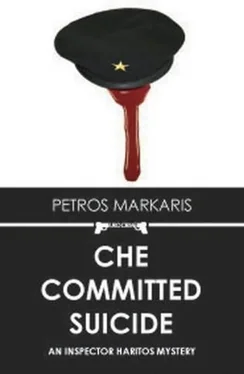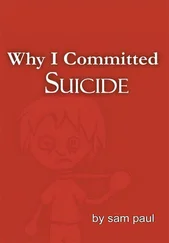Just as I expected, the announcement was the main news story. Its format and logo were exactly the same as the previous one and, at first sight, the text appeared to have been written by the same person.
It began:
The Philip of Macedon National Greek Front had issued warnings both in words and in deed…
and went on:
Unfortunately, those who should have listened to us turned a deaf ear. So, after Jason Favieros, we were also obliged to force the traitor, Loukas Stefanakos, to take his own life. Stefanakos was the biggest rat among all the anti-Greeks. It wasn’t enough for him that all the scum from the Balkans has settled in Greece, he also wanted to pollute the Greek schools with their languages and spread the infection that would destroy us as a nation. Of all the politicians who, today, are betraying our national interests, he was the one leading the round of underbidding. Loukas Stefanakos received the punishment he deserved. We hope, this time, that all the other zealots and champions of the Balkan rabble will get the message. We will continue with our executions till the stables of Augeias are finally cleansed and the Greek Nation is resurrected.
I thought of Petroulakis’s face the following morning after this announcement and I felt like calling in ill and cancelling the appointment.
I found a parking spot by the French Institute and said a prayer of thanks. Number 21 Dafnomili Street was a renovated two-storey house from the time when Neapoli was still a petit-bourgeois district in the shadow of the neighbouring high-class Kolonaki. Now, Dafnomili Street and Doxopatri Street, parallel to it, were inhabited by artists, university professors, government officials and all those who couldn’t find a place or were unable to afford the Lycabettus ring road, but who wanted to be able to say that they lived in Lycabettus. Rather like the backside of the Hilton, an area ever growing in size.
The wooden door was painted crimson with a golden handle and golden letter box, which testified to the fact that the house dated back to the middle of the previous century. I rang the bell and the door was opened not as in the past by some village girl adopted by the household, but by a Thai girl. She neither greeted me nor asked my name, but turned her back to me and began leading the way. When we reached a door, she stood to one side and allowed me to pass, like a hotel groom showing you into a room in a luxury hotel.
The living room extended through two adjoining rooms separated by an open white door with glass panels. The furniture wasn’t from the same period as the house, but nor was it what you would call modern. It was Louis-style furniture, as Adriani would say; the kind that as a child you see in others’ houses and hope one day you’ll have in yours, even if it’s no longer hand-carved but is factory-made. On the table in front of the sofa, I saw the morning newspaper. I picked it up to have a quick look, but I was interrupted by a hasty and commanding voice behind me.
‘Sit down, Inspector, and let’s get on with it because I have to leave.’
I turned round and saw a man in his forties, tall and thin, with hair starting to grey at the temples. He was impeccably dressed, an exact copy of the type Adriani drools over in Glamour and all her other TV soaps. I conformed to his wish and sat down.
‘Inspector Haritos, isn’t it?’ he asked, as if trying to place me.
‘That’s right. Head of Homicide, on sick leave.’
‘Ah, yes. Chief Superintendent Ghikas told me in glowing terms of your act of self-sacrifice.’ He paused for a moment, a sign that he was through with the niceties and was about to come straight to the point. ‘Mr Ghikas also told me that you are a trustworthy officer and that I can talk quite openly to you.’ He fell silent and gave me a searching look. What did he expect? That I would confirm it for him? He saw that I had no intention of doing anything of the sort and so he continued: ‘This whole business of the suicides is particularly unpleasant, Inspector. We’re talking about people who are extremely well known in the political and business world. However much we were saddened by the suicide of Jason Favieros, we all believed that the reasons were most likely personal. Loukas Stefanakos’s suicide, however, has overturned that simple explanation. Stefanakos committed suicide just like Favieros; it’s only reasonable to suppose, then, that there’s something linking the two events. And so the government has been burdened with a problem that it wasn’t expecting and one whose solution is out of its hands.’
‘The newspapers are talking of a scandal.’
‘There is no scandal, believe me. But that is no consolation to us. If there were, it would come out into the open, we would deal with it and that would be the end of it. But a non-existent scandal is a festering wound that could remain like that for weeks, even for months.’
‘I quite understand, Mr Petroulakis,’ trying to emphasise my understanding by my tone of voice. ‘Tell me how I might help.’
‘We want you, very discreetly, to discover the reasons why Favieros and Stefanakos committed suicide.’
‘That might take us some time, without even being certain that we’ll come up with something.’ I reflected as to whether I should continue and I voted in favour. After all, it was better that they should know what they were getting into, as Ghikas had told me the previous day. ‘We have no idea what we might uncover in the course of the investigations.’
He looked at me, more out of curiosity than concern. ‘What do you think you might uncover exactly?’
I told him about the whole business with Favieros, the real-estate agencies and the foreign workers who bought flats through them. He listened to me impatiently and every so often glanced at his watch to remind me that he had an urgent meeting. When I got to what Karanikas had told me, his patience ran out and he interrupted me.
‘I don’t believe that the reasons for Favieros’s suicide had to do with business, Inspector. You should look elsewhere.’
‘Where else, Mr Petroulakis? If he had any personal problems, his family and colleagues would have been aware of it. But they know absolutely nothing. And even if there were any, it would be a huge coincidence if the same personal problems also led Stefanakos to commit suicide.’
‘I’m not talking of personal problems, Inspector. I’m talking about those extreme right-wing nationalists who claim to have forced them into suicide.’
I started to wonder whether I really did have an adviser to the Prime Minister in front of me. Even the explanation put forward by Adriani and Karanikas about them being blackmailed by the TV channel was more believable.
‘What can I say…’ I replied as cautiously as possible. ‘If they had been murdered, I could understand it. Even if they hadn’t done it themselves, we would have found some lead. But suicides… It seems very unlikely to me.’
‘But they’ve admitted it themselves.’
‘When we catch them, they’ll deny everything, and we won’t have any evidence at all to indict them with.’
‘And what about the two Kurds who were murdered?’
‘We might get them for the murder of the Kurds, but we won’t have any evidence linking them to the suicides.’
He leaned over and picked up the newspaper from the table. He unfolded it and pointed to a particular spot. ‘Read it and you’ll understand,’ he said.
‘It was the leading article. I read at the spot he had pointed to.
All the rumours that the two men were being blackmailed by the TV channel that broadcast the suicides live are ridiculous and completely ungrounded.
Even in the hypothetical case that the channel was in possession of certain information, it is ethically unacceptable for anyone to claim that the channel would endeavour to urge a well-known businessman and a Member of Parliament to commit suicide, regardless of whether it might succeed or not.
Читать дальше












